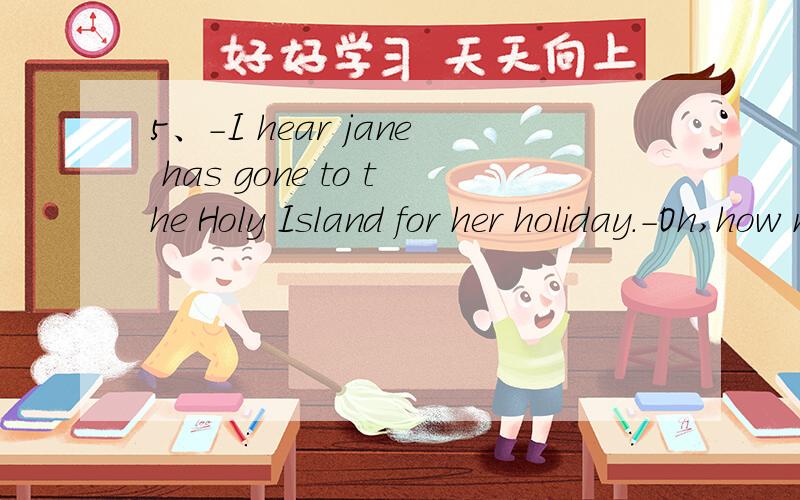5、-I hear jane has gone to the Holy Island for her holiday.-Oh,how nice!Do you know when she _____ A.was leaving B.had left C.has left D.left分析:本题是when引导的从句,后面用的是瞬间动词,那么就能直接把A、B、C排除.我
来源:学生作业帮助网 编辑:作业帮 时间:2024/04/28 22:49:25

5、-I hear jane has gone to the Holy Island for her holiday.-Oh,how nice!Do you know when she _____ A.was leaving B.had left C.has left D.left分析:本题是when引导的从句,后面用的是瞬间动词,那么就能直接把A、B、C排除.我
5、-I hear jane has gone to the Holy Island for her holiday.
-Oh,how nice!Do you know when she _____
A.was leaving B.had left C.has left D.left
分析:本题是when引导的从句,后面用的是瞬间动词,那么就能直接把A、B、C排除.
我就是不明白为什么排除C?
5、-I hear jane has gone to the Holy Island for her holiday.-Oh,how nice!Do you know when she _____ A.was leaving B.had left C.has left D.left分析:本题是when引导的从句,后面用的是瞬间动词,那么就能直接把A、B、C排除.我
完成时表示对现在的影响, 过去式表示动作
B和C都是完成时,为什么能排除B就不能排除C呢
离开是主动离开,不是被动离开
leave (left) 是一个瞬时动词(终止性动词),瞬间动词表示不能延续的动作,这种动作发生后立即结束。
给你补充点瞬时动词的用法:
1、因为瞬时性表示动作是短暂的不能够持续,瞬时性动词的现在完成时不能与表示一段时间的状语连用如:since,for等引导的状语。
He has died for three years.(错误) 因为die是一个瞬时性动词,所以不能...
全部展开
leave (left) 是一个瞬时动词(终止性动词),瞬间动词表示不能延续的动作,这种动作发生后立即结束。
给你补充点瞬时动词的用法:
1、因为瞬时性表示动作是短暂的不能够持续,瞬时性动词的现在完成时不能与表示一段时间的状语连用如:since,for等引导的状语。
He has died for three years.(错误) 因为die是一个瞬时性动词,所以不能和for three years表示一段时间的时间状语连用
但是可以改成:
He has been dead for three years. 将句中终止性动词转换为相应的延续性动词
He died three years ago. 将句中表示"段时间"的状语改为表示过去确定时间的状语
It is three years since he died. 用句型"It is+段时间+since..."表达
Three years has passed since he died. 用句型"时间+has passed + since..."表达
练习:He has come here for five days. 将其改为正确的。
注意:一些常用的终止性动词与相应的延续性动词的转换:leave→ be away, borrow→ keep, buy→ have, begin/start→ be on, die→ be dead, move to→ live in, finish→ be over, join→ be in/be a member of, open sth→ keep sth open, fall ill→ be ill, get up→ be up, catch a cold→ have a cold
2、瞬时性动词可用于现在完成时否定式中,成为可以延续的状态,因而可与表示一段时间的状语连用。
He hasn't left here since 1986. I haven't heard from my father for two weeks.
3、瞬时性动词与“until/ till”连用时,只能用否定式,表示“直到…才…”
You can't leave here until I arrive.
I will not go to bed until I finish drawing the picture tonight.
4、终止性动词完成时不可与how long连用(只限于肯定式):
How long have you come here? →How long have you been here?/ when did you come here?
How long haven’t you seen her?
5、终止性动词可以用于when引导的时间状语从句中,但不可以用于while引导的时间状语从句中。When既可以表示"点时间"(从句谓语动词用终止性动词),也可以表示"段时间"(从句谓语动词用延续性动词)。而while表示的是一个较长的时间或过程,从句谓语动词只能用延续性动词。
When we reached London, it was twelve o'clock. (reach为瞬时性动词)
Please look after my daughter while/when we are away. (be away是延续性)
6、在连词since引导的时间状语从句中, 用终止性动词的过去时或用延缓性动词过去时,其含义是大不相同。
A、since所引导的时间状语从句中,如果句子谓语是瞬时性性动词的过去时, 则从句表示的时间是从“那一时刻开始”: He has studied very hard since he came to our school.
B、since所引导的时间状语从句中,其谓语是持续性动词的过去时,那么从句所表示的时间是从持续性动词所表示的动作结束时算起:
I haven’t heard any noise since I slept. “我醒后还未听到任何声音”。
C、since所引导的时间状语从句中,其谓语是持续性动词的现在完成时,则表示动作和状态延续到现在(说话时刻),那么从句所表示的时间是从动作发生之时算起:
I haven’t heard from him since he has lived there。这里has lived表示动作的持续性,时间的起点应从:“开始居住”时算起。因此此句可理解为“自从他(开始)住在那儿起,我就一直没收到他的来信”。
总结:由此可见,since引导的从句持续动词的一般过去时和现在完成时所表示的意思恰好相反。换言之,前者以肯定的语法形式反映着否定的逻辑内容,而后者的形式与内容是一致的。
比较:Since I’ve been at this school, we have had three headmasters.
Since I was at this school, they have had three headmasters.
He has never been to see me since I have been ill.
He has never been to see me since I was ill.
解释: John is now with his parents in New York, it is already three years since he was a teacher
How long is it since you lived in Shanghai?
He has written to me frequently since I fell ill.
He has written to me frequently since I was ill.
注意:在“it is…since…”结构中,since引导的从句绝对不能用否定式的谓语动词来表示否定的意义。
It is a long time since he didn’t study English. →It’s a long time since he studied English
It’s two months since you didn’t come to see me. →You haven’t come to see me for two months.
7、介词for引导的时间状语,在翻译时有两种不同的情况:
A.介词for引导的时间状语和延缓性动词的现在完成时的否定式连用时,有两种不同的含义: He has not lived there for six months. 他不住在那儿已六个月了。(或:他住在那儿还不到六个月。)
B.介词for引导的时间状语和终止性动词的现在完成时的否定式连用,只有一种含义: Mary has not left here for six months. 玛丽已六个月没有离开过这儿了。
8、持续性动词和瞬时性动词的过去时与完成时的区别
I worked here for more than twenty years. 表示动作结束了。
I have worked here for many years. 表示动作持续到现在,还要继续下去。
I saw this film yesterday. (强调看的动作发生过了。)
I have seen this film. (强调对现在的影响。)
三、现在完成时
1、现在完成时的"完成用法":现在完成时的"完成用法"指的是动作发生在过去某一时刻并已结束,但该动作对现在产生了影响,与现在情况具有因果关系。
例如:He has turned off the light.他已把灯关了。(动作结束于过去,但说明的是现在的情况--灯现在不亮了。)
现在完成时"完成用法"的特点是动作不延续,因此,该时态只能与表示不定的过去时间状语(如:already,yet,before,recently等)、频度时间状语(如:never,ever,once等)、包括现在时刻在内的时间状语(如:this morning / month /year...,today等)连用。
例如: Have you found your pen yet?你已找到你的钢笔了吗?
2、现在完成时的"未完成用法":现在完成时的"未完成用法"指的是动作开始于过去某一时刻,一直延续到现在,或可能还要继续下去。
例如:He has lived here since 1978.自从1978年以来,他一直住在这儿。(动作起始于1978年,一直住到现在,可能还要继续住下去。)
I have been in the army for more than 5 years.我在部队已经呆了五年多了。(动作开始于5年前,一直延续至今,有可能还要继续下去。)
此种用法的句中常需一个表示一段时间的状语(由since或for引导),或表示与现在时刻相连的时间状语(如:up to now,so far)等。
例如:I have heard nothing from him up to now.到目前为止我没有他的任何消息。
注意:(1)现在完成时的未完成用法只适用于延续性动词,不可用于终止性动词,即瞬间完成或延续时间很短的动词。如:come,go,arrive,leave,join,become,die等。
收起